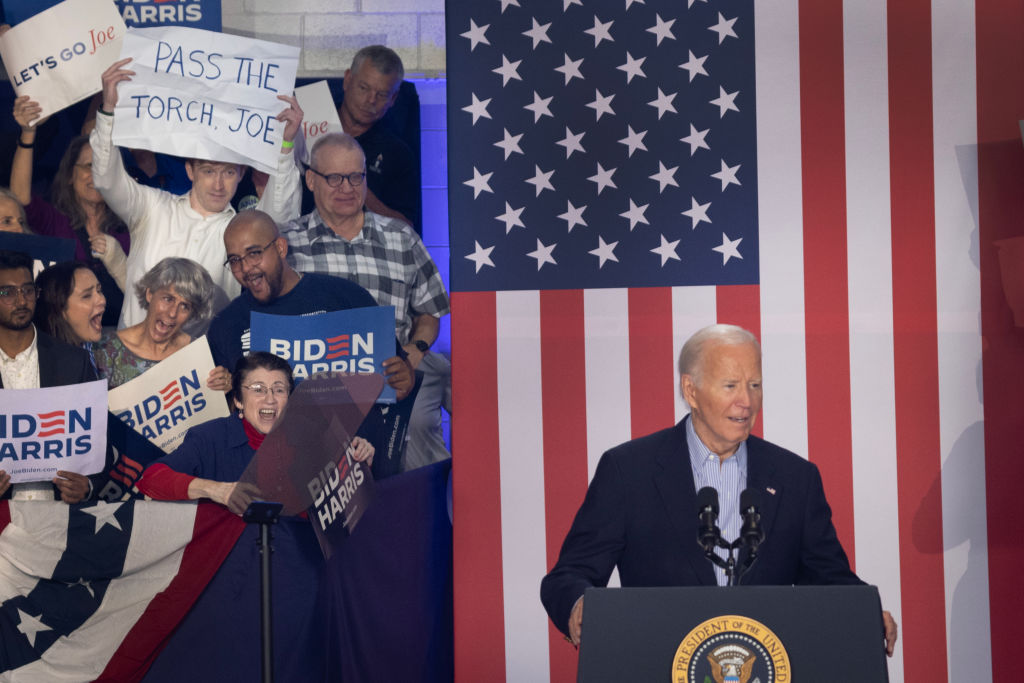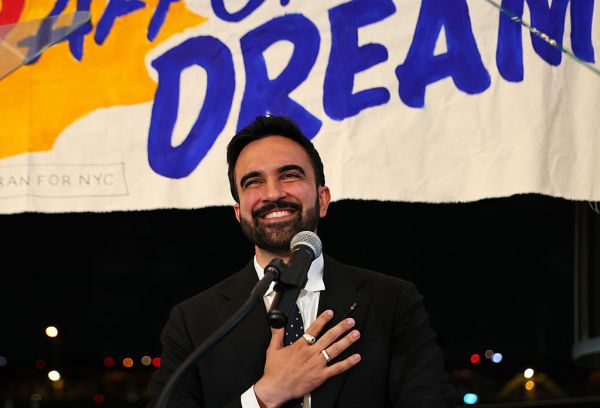Hello and happy Saturday. I hope you enjoyed the Fourth of July! The weather in the Ohio bureau wasn’t very conducive to celebrating, but that left plenty of time to watch that quintessential cinematic classic, Independence Day. Has anyone asked Bill Pullman if he’d like to run for president? The man can deliver a speech.
I wrote last week that it felt like we were watching history in the wake of President Joe Biden’s disastrous debate performance. We have an adage in this business that “journalism is the first rough draft of history,” and the past 10 days have generated enough rough drafts to keep a generation of historians busy honing and refining until they can explain it.
Biden sat for an interview with ABC News’ George Stephanopoulos yesterday that aired at 8 p.m. ET. The president needed to make such an effort, but his performance “was not reassuring,” Chris Stirewalt writes in his newsletter this morning (🔒):
Biden can’t become a different person or de-age 20 years, and he especially can’t do it with the whole world coming down on him. Indeed, the Democrats who have been calling on him to get out there and dispel the doubts about his candidacy are asking the man who, until nine days ago was their presumptive nominee, to walk into a buzz saw.
The debate, the fallout, and now the middling interview performance laid bare the Democrats’ colossal mistake in not reckoning earlier with the signs that Biden might not be up to the job. Four months from the election, the party faces an enormous challenge—and has few ways to deal with it, none of them good.
In his Tuesday column, Stirewalt compared the 2024 election to the 1944 election, when President Franklin D. Roosevelt ran for a fourth term despite facing overwhelming health challenges and doctors warning he was unlikely to complete another term. It’s an interesting parallel, but Stirewalt warned against reading too much into it. “Aside from the many differences between the two men, the state of the world, the media, and the nature of politics, there is this,” he wrote. “Roosevelt may have been almost sure to die in his next term, but he was also almost sure to win it.”
Before the debate, Biden had been narrowly, but consistently, behind Trump in the polls. He now trails his challenger by 3.3 points nationally in the latest RealClearPolitics polling average, and that deficit could soon be larger. In polls conducted after the debate, both the New York Times and the Wall Street Journal show Trump leading Biden by 6 points.
In Wednesday’s Boiling Frogs (🔒), Nick wondered just who thought hiding Biden’s decline from the public was a good idea—and why they thought they could get away with it. “The wider Democratic Party and its media enablers would not have bet the presidency on someone whom they had reason to believe might plausibly implode onstage four months out from Election Day,” he wrote. “Although I suppose members of Joe Biden’s inner circle—the villains of history—would do that, because they did.”
Calls for the president to step aside have been met with the criticism that it’s “unfair” to ask Biden to do so, because he “deserves” better. In response, Jonah channeled Clint Eastwood’s character in The Unforgiven: “Deserve’s got nothing to do with it.” In Wednesday’s G-File (🔒), he wrote: “When politicians indulge their self-interest to the point where continuing to do so harms the party and they fail the cost-benefit test, they’re supposed to get out of the way ‘for the good of the party.’ If they refuse to do so, the party is supposed to throw them overboard.”
Which brings me to the editorial we published on Tuesday, calling for the Democratic Party to do exactly that. Democrats are correct to raise the alarm “about the distinct threat Trump poses to the country and the constitutional order,” so it’s time for them to heed their own warnings:
The Biden campaign has repeatedly insisted that “90 minutes does not negate three-and-a-half years of results.” Setting aside that fewer than 4 in 10 voters approve of those “results” and only 1 in 4 believe the country is on the right track, a second term in office is not a reward for a job well done. No, presidential elections are forward-looking, and this coming November’s contest will be a referendum on whether the incumbent can effectively do the job for another four years. He cannot.
And there is no knight in shining armor riding to the rescue. The political group No Labels, which tried to find an independent candidate to lead a unity ticket challenging Biden and Trump, is shrugging its shoulders, saying “told ya so,” and that it’s too late now. “All the work that we put in over the last couple of years was for exactly this moment,” Ryan Clancy, the group’s chief strategist, told Dispatch Politics. “It was an insurance policy. You hope not to use it, but you do if something happens, right?”
No Labels had secured ballot access in 25 states, but abandoned its effort in April after being unable to find a candidate. Now they have people reaching out to see what can be done.
“We checked into this,” Clancy said. “We thought we owed it to ourselves and our community. We talked to our lawyers, and we talked to our ballot teams. We were like, ‘Guys, you know, is there anything that could be done here?’ And unfortunately, there really isn’t.”
If not Biden, then who for the Democrats? That’s a thornier question than it should be. The most obvious choice would be the vice president, but Kamala Harris is not really any more popular than Biden—and she doesn’t have much of a record of success to lean on.
Kevin, however, has a suggestion for how this could all play out—not that anyone will take it. On Friday, he proposed that Harris make a graceful exit speech declining the nomination and, in return, she gets … whatever she wants. “There’s a gubernatorial election in California in 2026, and Gavin Newsom could do a great deal to clear the way for Harris if she wanted to be the Democratic nominee, which would all but ensure her election,” Kevin noted. “Maybe she’d like a prestigious professorship or the presidency of a university and a couple of Silicon Valley board sinecures; I suspect that the necessary vacancies could be arranged.” But if she doesn’t? “Kamala Harris can go down in ignominy by losing as vice president or, maybe, go down in ignominy by losing as president after serving in the office for 11 minutes, the Lady Jane Grey of American politics.”
So here we are, still watching history. And in fact, there was another potentially historic happening this week that I haven’t even mentioned yet. The Supreme Court ruled that presidents do not enjoy absolute immunity while in office, but they left plenty of wiggle room. Specifically, as Michael Warren and Sarah noted in The Collision, the majority opinion held that “immunity extends to official discussions between the President and his Attorney General” and sent the case back “to the lower courts to determine in the first instance whether and to what extent Trump’s remaining alleged conduct is entitled to immunity.”
The practical consequence: Donald Trump’s federal trial for election interference likely won’t begin before the November election. To get a sense of how the court handled the various degrees of presidential immunity, be sure to read the rest of The Collision and Tuesday’s Morning Dispatch (🔒). Plus, don’t miss Sarah and David French’s analysis on Advisory Opinions and Jonah’s explanation of why he isn’t a fan of the ruling in Friday’s G-File. (Yes, the latter takes a while to get to the point but you’ll enjoy his ruminations on Farrah Fawcett along the way.)
I’ve departed from my normal format this week because of the gravity of the news, and I’m going to close with a plea I try not to make too often. The next few months are going to be more than a little crazy, and we’re prepared to do the reporting and analysis necessary to help you make sense of it all. We thank those of you who are already paid members for supporting our work. And we appreciate those of you who have signed up for our free newsletters and articles. As it happens, we’re doing a little sale this weekend, so there’s never been a better time to join. Here are the details. Thanks as always for reading.
You can take $17.76 off an annual Dispatch membership this weekend—just use the promo code DISPATCH1776.
- Click the “Join Today” button below
- Click “Try 7 Days Free” under the Annual Subscription box
- Enter DISPATCH1776 in the promo code box, then click “Apply”
- Complete your purchase










Please note that we at The Dispatch hold ourselves, our work, and our commenters to a higher standard than other places on the internet. We welcome comments that foster genuine debate or discussion—including comments critical of us or our work—but responses that include ad hominem attacks on fellow Dispatch members or are intended to stoke fear and anger may be moderated.
With your membership, you only have the ability to comment on The Morning Dispatch articles. Consider upgrading to join the conversation everywhere.